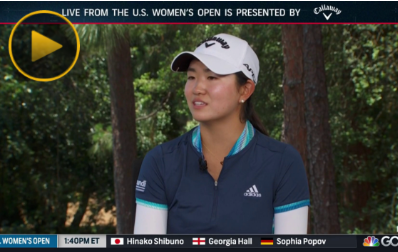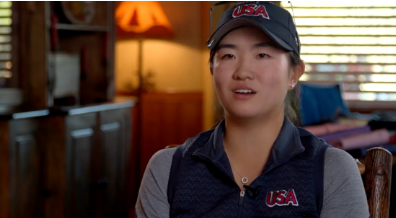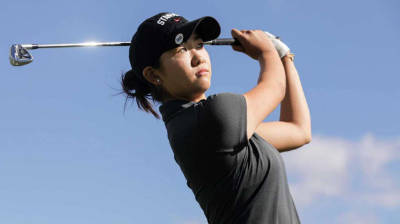Brendan Quinn, May 30, 2023
PALO ALTO, Calif. — Let’s start with the tour, because if you can keep up with this, you can keep up with Rose Zhang. It’s moving. We’re moving. She’s five paces ahead, slipping through the Stanford campus like some sort of prodigious pontoon. Everything is fast. Moving. Talking. Walking. Her giant Nike backpack is fastened tight, holding on for the ride. She points over there. “Look at that!” She points over here. “Isn’t that amazing?”
The Stanford campus moves under our feet and you can feel it. A combination of person and place that’s damn-near intrinsic.
In what amounted to a period of deferred destiny, Rose arrived here two years ago and proceeded to win everything. All of it. Two years in college golf rewriting the NCAA record book. Teenage years spent becoming one of the greatest amateur players — male or female — ever; yes, ever. Rose, as she’ll be referred to here, because prodigies operate mononymously, became the world’s No. 1-ranked women’s amateur in September 2020 — nearly 33 months ago. Hasn’t budged since. She won the 2020 U.S. Women’s Amateur at 17, enrolled at Stanford, won 12 of 20 college tournaments, claimed the 2023 Augusta National Women’s Amateur, and capped things off nicely by becoming the first female golfer to win consecutive NCAA individual titles.
Yet, trekking across campus, she looks back to tell me the other kids at Stanford — the ones we’re blurring past — they’re the special ones.
“The people that I’m friends with?” she says. “I’m constantly like, you guys are incredible. I can’t even show my face here.”
There’s no known data for how many prodigies operate with an inferiority complex, but there’s at least one. Which makes this all the more tricky. Because, folks, it’s time.
With some words that will carry, Rose announced last week that she is, at last, turning professional. Her unmatched amateur career is over. She’s heading to Liberty National Golf Club this week for a news conference and her pro debut at the inaugural Mizuho Americas Open. She’ll play a course where millions of tons of clay and fill were once laid to offer better views of Lower Manhattan and the Statue of Liberty. Seems appropriate. She’ll arrive prepackaged, complete with millions of dollars in sponsorship contracts with Callaway, Adidas, Delta, East West Bank, Rolex, USwing, Beats by Dre and others. She’ll be billed as a generational talent with global appeal. Oh, and that swing. Everyone will swoon. Then, this summer, she’ll play in the remaining four majors and, if all goes to plan, use a series of tournament exemptions to secure her LPGA Tour card.
This has all felt so inevitable for so long. The same way the NBA is waiting for Victor Wembanyama, and the NFL is waiting for Caleb Williams, golf has been waiting for Rose Zhang.
But here, she stops. No, Rose says. She is not like them. She’s just like everyone else. “I don’t think players on tour know who I am,” she tells me. “I’m just going to be a newbie out there.”
Maybe that’s what she needs to tell herself. Rose has had to figure out a lot in her life — how to embrace her talent, how to be coached, how to handle the contours of a father-daughter relationship, how to be the star of a superteam at Stanford, how to turn pro, how to find some control, how to be … normal.
That, truth be told, is why she’s pushed this off for so long. But now, “There’s not a lot of ambition left for, like, where my career is right now. Because I basically won the events that there are to win.”
We’re moving again. Rose has a favorite spot she wants to show me. It’s a little slice of whimsy next to Memorial Church. There’s a small courtyard off the main quad, in the shadow of the church’s Old Testament mosaics and stained glass. There, she points to a stone circle on the ground. The inscription around it reads: “For the troubled may you find peace ~ For the despairing may you find hope ~ For the lonely may you find love ~ For the skeptical may you find faith ~”
“OK, wait, wait, wait,” she says, excited, pointing to the center. “Now, stand here and talk.”
There, in the middle, one can speak and hear something no one else can.
“An echo,” Rose says. “Just in this one spot.”
Where did Rose Zhang come from? Depends on where you want to start.
Do you want to begin in Dōngběi? The region in northeast China where “a huge, huge, little circle of family” still resides? The Zhang surname is one of the most common in China, making it one of the most common in the world, too. Rose says she’s been told there are roughly 200 members of the Zhang family on her father’s side. “No clue who they are,” she says. Rose has only visited twice. Once as a child, once in 2019 to play golf for three days.
Both Li Cai, Rose’s mom, and Haibin Zhang, are natives of Shenyang, a city of 8 million. They married in China and had a son, Bill, in 1993.
Or do you want to start in Arcadia, Calif., about 10 miles northeast of Los Angeles in the San Gabriel Valley? Haibin and Li arrived there in 2001, settling in a small apartment. They posted an ad at the local supermarket for an available room and rented out the little spare space they had to help make ends meet. When a daughter, Rose, was born in 2003, she lived in the main bedroom with her parents.
“Humble beginnings,” Bill, 30, says now. “It was different than the immigration that we see now, where you have, like, a rich generation that’s coming, that made a lot of money overseas, and they kind of come over here for a new life.”
Or you can start in Irvine, about 50 miles south of Arcadia, where the Zhang family moved to a new home around 2008. The house was walking distance from a sprawling dirt pasture, cleared for new development. Around 9, Rose picked up one of her father’s golf clubs. He was right-handed. She was left-handed. Didn’t matter. She held that club and the forces of fate or brilliance or a greater power took over. Anne Walker, Rose’s coach at Stanford, has long wondered about this moment. She imagines young Mozart sitting at the piano, hearing a piece of music, bringing his fingers to the keys, and playing it.
Haibin, who goes by Henry in the U.S., brought 9-year-old Rose over to that dusty field and dropped down a patch of carpet with a bag of used golf balls. Rose was a kid, but already an athlete. She played tennis and basketball, dabbled in soccer and swimming. Now, standing in front of this makeshift driving range, she began swinging. One after another, she hit ball after ball. Haibin drew a line in the dirt for each straight shot. For every five, he’d complete the Mandarin symbol “正”, meaning, “straight, correct, true/right.” Rose would hit 500 or 600 balls, leaving the ground covered in the symbol. Then Rose and Haibin would handpick each ball.
“Wasn’t too hard,” she says. “They were mostly in a straight line.”
Quickly, maybe disturbingly so, Rose developed a well-rounded game. She practiced constantly, working on her short game at a city-owned open space for jogging and biking. She played nine holes a month after first swinging a club. A month after that, using a seven-club set that Haibin bought for $200, she played her first tournament. She won for the first time three months later.
When asked about these early days, and about her coach imagining Mozart at the piano, Rose turns embarrassed. I ask if that’s what it felt like for her to swing a golf club. She pauses a few beats.
“Yes,” she nods, pausing again. “Yeah.”
George Pinnell, a renowned teaching pro, began working with Rose around age 11. Pinnell is old-school, rejecting the modern idea of teaching kids to hit the ball as hard as possible and figure out the rest later. Pinnell wants the opposite. Controlled, compact, structured swings. No slack. All tempo. “Tight swings hold up longer than loose swings,” the 77-year-old says.
A post shared by Rose Zhang (@rosezhang)
In Rose, Pinnell found his muse. “She was very unusual.” From the beginning, Rose came upon every shot like she was entering a windowless room.
“I would give her something to do in a lesson and she’d stand there for 30 seconds and just gaze off,” George says. “She still does this. She’s trying to picture how to make her body make the swing that she’s being told to make. Then she does it.”
Pinnell says Rose’s genius is a combination of the mental focus she learned from her father, the work ethic she acquired from her mother, and a swing she’s crafted herself.
What really makes Rose different, though, is control. Self-control. Not too long ago, she sat on a range bucket at her old training facility talking to a group of junior girls. They were in awe of Rose, all perched forward, hanging on every word. Then Rose told them something they didn’t see coming: There have been other AJGA and NCAA players who’ve been better than her.
“Then why do you always win?” one girl asked.
“I make fewer mistakes than they do,” she responded.
It had been such a long week. The most stressful of her life. The 2023 Augusta National Women’s Amateur was the lone missing trophy on Rose’s amateur mantle and the storyline was an easy hook. After she finished Rounds 1 and 2 at Champions Retreat at 13-under with no bogeys and a five-shot lead, Golf Channel began what amounted to an uncomfortable on-air coronation. When asked by Brandel Chamblee how she would play with such a large lead, she responded, “I hold myself accountable regardless of outcome.”
Then Rose teed it up for the final round. Pressure. Weather. Nerves. Whatever. Forces combined and Rose looked lost in the gravity. She doubled Augusta’s first. It wasn’t just tension. Something was amiss with her swing. Another bogey. Then another. Wild off the tee, she careened around the opening seven holes at 4-over. Those following — fans, her Stanford coaches and teammates — they didn’t understand what they were seeing. Who was this person? A three-hour rain delay hit as Rose teed off on No. 8 with her lead down to two.
The delay helped. But a swing issue — a flaw in her grip — wasn’t fully resolved.
Rose did all she could to stick to her process. She knows demons. Not well, but has shaken hands. She shot a final-round 75 in the 2022 NCAA Championships and nearly fumbled a lead that proved insurmountable. Her final-round 75 in the 2021 ANWA cost her a spot in a playoff by one stroke. She, in her words, “choked” at the 2019 Junior PGA with a birdie-less 3-over final round after shooting the course record two days earlier, and lost to Yuka Saso. Yes, Rose has occasionally lost.
So, back to 15. From 230 yards out. A two-shot lead. Easy decision. Lay up, maybe make birdie. Play her game. Trust her instincts. Make fewer mistakes than the rest. Hoist a trophy.
That’s when the camera zoomed tight. Earlier in the week, Rose planned to use her father as caddie for the opening two rounds at Champions Retreat, then rely on an Augusta National caddie with local knowledge for the final round. Instead, after stretching her lead to five going into that Saturday, Haibin was back on the bag. And there, in the middle of the 15th fairway, the two burst into a long, animated conversation.
Eventually, Rose gripped a 3-wood. The shot never had a chance. Thinned it. She wasn’t committed.
As the approach landed short of the green and trundled downhill into the water, Rose raised her hand and slapped her thigh. It looked like frustration over a poor shot. In reality, it was a look inside the living room of a complex, impenetrable father-daughter relationship.
In multiple post-round interviews, Rose offered a pacified version of the events on 15.
Here, months removed, a different story.
“That shot, that was my dad, I’m not even gonna lie,” she says, with a snort laugh.
As it turns out, Haibin told Rose to go for it. She disagreed. He repeated himself. She disagreed. He said it again. And she went for it.
“Slapping my thigh, that was like, wow, the most reaction you’ll see from me,” she says. “I was like, dude, that’s the dumbest mistake I’ve ever made. Because I would never do that. If I went in the water, and it was on my own accord, my reaction would be a lot more different. But I freaking knew it.”
Rose says it wasn’t her father’s fault for encouraging her to go for it. It was her fault for listening to him. That’s why she took ownership for it in those interviews. She learned a long time ago that while her plight is the inability to control the outside, her superpower is controlling what’s inside.
Like the 2020 Ping Invitational. Rose was the event’s defending champion and expected to repeat. Then she shot a second-round 75. Afterward she sent George Pinnell a rare text message bemoaning her play, but didn’t ask for advice, so he kept quiet.
The next day, Rose shot a bogey-free 5-under 67 and won, joining Jordan Spieth as the only two-time Ping Invitational champion.
George desperately wanted to know what happened. A few days later, on the range, he casually asked. Rose told him that after the second round, she took a single club to the practice area, went through the fundamentals, checked her club position, and realized she was getting inside her hands on the takeaway. That was it. She never hit a single ball. She was there for 10 minutes.
“Her mental capacity and her understanding of what she’s doing is off the charts,” Pinell says.
So, yes, Rose Zhang is best off listening to herself.
Rose bogeyed the 15th at Augusta, by the way. Moments later, Jenny Bae, a top-25 amateur in the world, birdied the 17th, moving into a tie for the lead. For the first time at the 2023 ANWA, Rose wasn’t alone in first.
Of course, in time, she found a way. Rose and Bae went to a playoff. Bae badly missed an approach into the first hole of their sudden-death finish. Rose finished with a tidy par for the win.
She hugged her father.
Then she was swarmed by her Stanford teammates.
So, what about Dad? Rose knows what’s out there. Stereotypes about Asian parents. Assumptions that she’s ducking a low-flying helicopter. She asked that neither her mom nor dad speak for this story. Originally, it seemed like concern based on the language barrier.
But in time, it seemed to be something else.
Safeguarding not herself, but them.
“She’s very protective of my parents,” Bill says. “My parents are very passionate. My dad is very passionate. Sometimes that gets lost in translation. … So she’s protective.”
Bill is the bridge between eras. He’s 10 years Rose’s senior and was 8 when the family moved to the U.S. “The mix between my generation and my parents’ generation,” Rose says. He went to Cal State Fullerton on an academic scholarship, not quite understanding that his sister was on her way to stardom. “It was like, oh, that’s nice for you. Maybe you’ll win a trophy,” Bill remembers.
Things got real, though, when Haibin stepped away from work to focus his energy on Rose’s pursuits in junior golf.
George Pinnell remembers: “You should understand, a lot of her early development was done by her father. Not from a swing standpoint. He was never involved in our lessons. He left us alone. Where he really was significant was in her mental state of the game. How she works, how she thinks. That’s her father.”
Rose and her father traveled from event to event in those early days. Li Cai remained at home, where she worked as a dental technician. Bill, meanwhile, hustled, working side jobs at a financial firm and as a notary, sending cash home to help out. On the road, Rose and Haibin stayed in motels, occasionally slept at the airport, flew redeyes to avoid extra night stays and once slept in a rental car.
Rose assumed all the other elite golf kids were doing the same. Not quite, she learned later.
Financial burdens were eventually eased when Rose’s talents in school and golf earned her scholarships and grants. Callaway invited her into the family when she was 13, giving her access to facilities and equipment. But dad was still in charge. “A pretty traditional Chinese family,” Rose says. As a result, teenage Rose was subscribed to a schedule — play, travel, social dinners, meetings with potential business partners. She practiced so much that everyone from coaches to her brother asked her to dial it back. She played injured. She played tired. It wasn’t sustainable.
In another world or at another time, Rose might’ve simply transferred that high school world into professional life. Turn pro, hit the road with dad, do what he says.
Instead she went to Stanford, 400 miles from Irvine. On her own.
The windows are open in the second-floor classroom of Lane Hall, letting in the sounds of a late Friday afternoon in Palo Alto. It’s perfect out there. Eighty degrees. Sun-drenched. Slight breeze. Every fountain on campus is filled with frolicking half-naked students. (Rose would never. “Just straight up in public like that? No chance.”)
CS106A: Programming Methodologies.The teacher’s aide leading the lecture is barely older than the students. He’s wearing a Patagonia hat and answering correct responses with: “Yes, sick,” “That’s chill,” and, when one student is unsure of a solution, responds, “Super valid question.”
Rose is behind a MacBook Pro, following along. The TA reads out a formula while scribbling on a whiteboard, “… equals, input, parenthesis, input, parenthesis, enter third number, colon, space, parenthesis …”
Fifty incalculably boring minutes of computer coding.
Class wraps up around 5 p.m. and we’re off. Stanford is a place that often feels staged, like some AI-generated postcard of Gen Z college life, packed with polymaths and geniuses, with virtuoso artists and future billionaire computer programmers. An odd mix of chaos and academic pedigree. We see visiting high school students and Rose says they look so young. A rogue student a cappella group assembles from nowhere and starts performing in front of the bookstore. We watch for a moment. Rose is thrilled by the randomness of it all.
But Rose laments. She was warned not to take that coding class. Especially not in-season. “It’s too much.” She’s regretting it, just as she regretted taking 21 units last quarter. “The dumbest thing I’ve ever done.” When we spoke in March, she had a five-page paper due on the causes of the Cold War (“Which is ridiculous,” she said. “How can you write that in five pages?”) and a 4,000-word paper due on integrating discipline into children’s books. On top of all this, Rose is regularly taking Mandarin. She’s fluent, but cannot read or write. This is common. There are over 50,000 characters to memorize.
“I find Chinese to be very interesting,” she says. “It’s a very beautiful language. Especially when you learn to write. It’s very pretty — the characters. But it is very hard, requires a lot of brain work. You have to be proactive in your learning or you’ll forget everything. It’s like math, except I hate math.”
The catch is, none of this is necessary. Future Millionaire Golfer Rose Zhang does not need to take computer programming or learn about the Cold War.
“Literally,” she stresses, smiling, “And I’m here suffering, learning to code.”
So, why? There’s no moral hand-wringing over golfers or tennis players or soccer players ditching high school to pursue professional sports. Rose could’ve made the jump years ago. Her parents wouldn’t have stopped her and her talent was without question. She played in the 2019 U.S. Women’s Open as a 16-year-old and made the cut. That week, on a patio at the Country Club of Charleston (S.C.), Haibin suggested it might be time for his daughter to make the leap then. “She’ll know when she’s ready,” George responded.
























